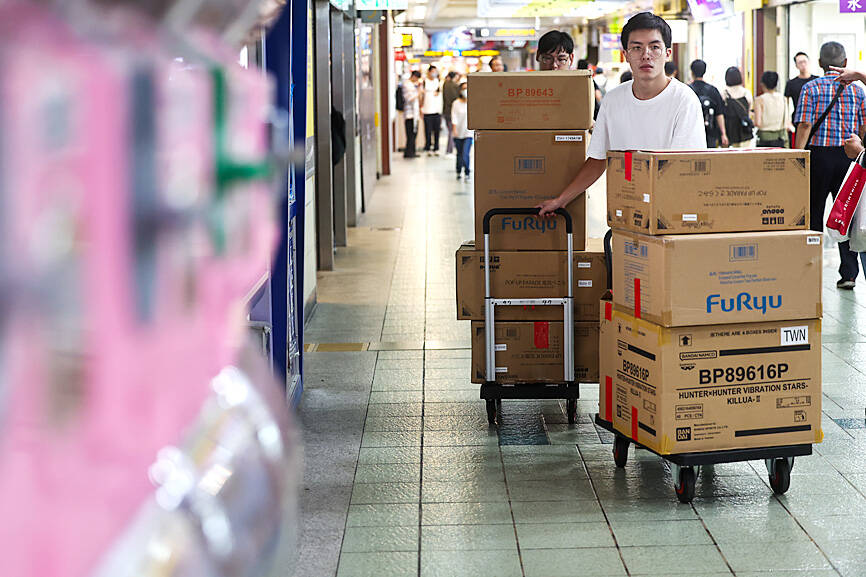The number of job openings in Taiwan reached 248,000 at the end of August, rising by 6,200 from three months earlier and up by 3,700 from a year earlier, as the issue of mismatching deteriorates and the society ages, the Directorate-General of Budget, Accounting and Statistics (DGBAS) said yesterday.
The latest number suggested an overall job vacancy rate of 2.84 percent, the highest for the same period in three years, with rates in different sectors varying but being consistent with their seasonal business demand, the agency said.
In the manufacturing sector, the number of job openings stood at 87,000, or 35.3 percent of the total, with a job vacancy rate of 2.97 percent, the DGBAS said, adding that manufacturers have the worst workforce shortages, and their payroll is most susceptible to the technology product cycle.

Photo: CNA
Electronics firms contributed 19,000 vacant positions, while computer and optical goods producers saw job openings rise by 10,341, and electricity and gas suppliers had 1,822 job openings, it said.
Meanwhile, the number of job openings amounted to 39,684 at wholesales and logistics firms, and 20,741 at restaurants and hotels, it said.
Human resource firms have advised local tech firms to recruit workers from abroad, as Taiwan is aging rapidly and local people in need of work do not have the required skills, while the online 104 Job Bank (104人力銀行) projected job openings of more than 1 million, mostly at relatively low-paid service facilities.

UNCERTAINTIES: Exports surged 34.1% and private investment grew 7.03% to outpace expectations in the first half, although US tariffs could stall momentum The Chung-Hua Institution for Economic Research (CIER, 中華經濟研究院) yesterday raised its GDP growth forecast to 3.05 percent this year on a robust first-half performance, but warned that US tariff threats and external uncertainty could stall momentum in the second half of the year. “The first half proved exceptionally strong, allowing room for optimism,” CIER president Lien Hsien-ming (連賢明) said. “But the growth momentum may slow moving forward due to US tariffs.” The tariff threat poses definite downside risks, although the scale of the impact remains unclear given the unpredictability of US President Donald Trump’s policies, Lien said. Despite the headwinds, Taiwan is likely

When Lika Megreladze was a child, life in her native western Georgian region of Guria revolved around tea. Her mother worked for decades as a scientist at the Soviet Union’s Institute of Tea and Subtropical Crops in the village of Anaseuli, Georgia, perfecting cultivation methods for a Georgian tea industry that supplied the bulk of the vast communist state’s brews. “When I was a child, this was only my mum’s workplace. Only later I realized that it was something big,” she said. Now, the institute lies abandoned. Yellowed papers are strewn around its decaying corridors, and a statue of Soviet founder Vladimir Lenin

UNIFYING OPPOSITION: Numerous companies have registered complaints over the potential levies, bringing together rival automakers in voicing their reservations US President Donald Trump is readying plans for industry-specific tariffs to kick in alongside his country-by-country duties in two weeks, ramping up his push to reshape the US’ standing in the global trading system by penalizing purchases from abroad. Administration officials could release details of Trump’s planned 50 percent duty on copper in the days before they are set to take effect on Friday next week, a person familiar with the matter said. That is the same date Trump’s “reciprocal” levies on products from more than 100 nations are slated to begin. Trump on Tuesday said that he is likely to impose tariffs

READY TO BUY: Shortly after Nvidia announced the approval, Chinese firms scrambled to order the H20 GPUs, which the company must send to the US government for approval Nvidia Corp chief executive officer Jensen Huang (黃仁勳) late on Monday said the technology giant has won approval from US President Donald Trump’s administration to sell its advanced H20 graphics processing units (GPUs) used to develop artificial intelligence (AI) to China. The news came in a company blog post late on Monday and Huang also spoke about the coup on China’s state-run China Global Television Network in remarks shown on X. “The US government has assured Nvidia that licenses will be granted, and Nvidia hopes to start deliveries soon,” the post said. “Today, I’m announcing that the US government has approved for us